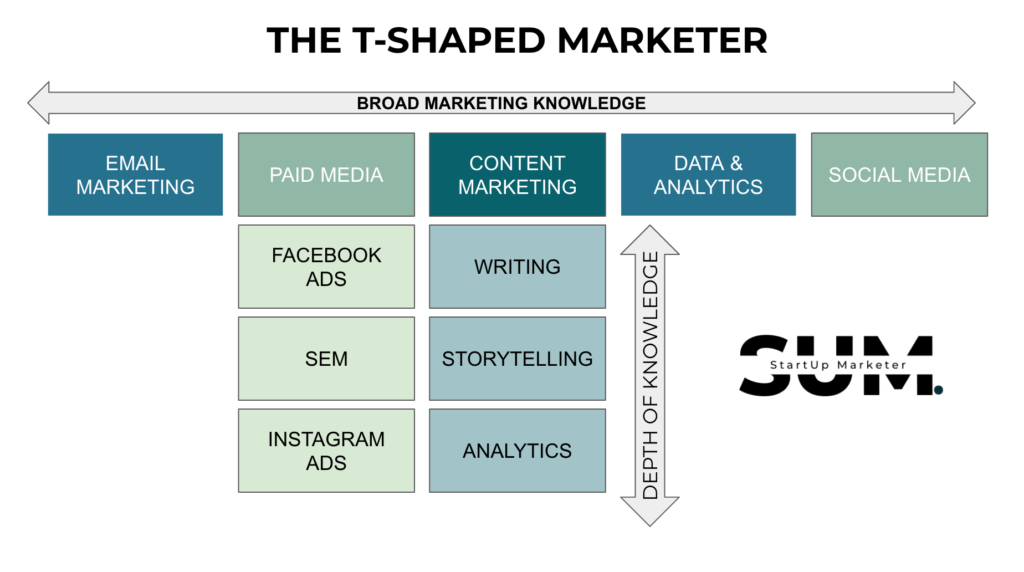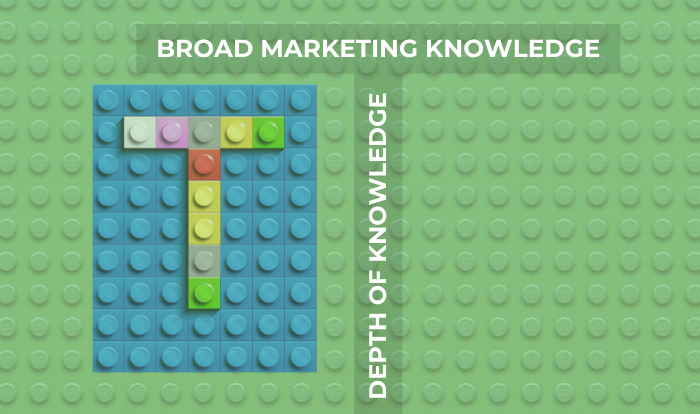Digital marketing gets more complex every day. And with companies allocating 72% of their marketing budget towards digital marketing channels, it’s become more important than ever. That’s why the T-shaped marketer model has emerged as a strategic cornerstone to help us startup marketers navigate the intricate landscape of online business promotion. The T-shaped marketer is someone with expertise in anywhere from one to three marketing disciplines (hence, the T shape). This comprehensive guide delves into the T-shaped marketer skill set’s essential components, providing you with a nuanced understanding of the strategies and tactics needed to thrive in this dynamic startup marketing world.
Decoding the T-Shaped Marketer Model
Digital marketing, as we all know, has an endless stream of multifaceted demands. As such, this requires you as a marketer to have a unique blend of specialized expertise and broad knowledge across various disciplines. The T-shaped marketer, depicted by the horizontal line symbolizing a broad understanding and the vertical line indicating deep expertise, embodies this versatile skill set. dynamic skill set.

Here’s a step-by-step playbook to how you can build your “T” skillset to generate major gains for your startup.
1. Building Your Specialism: The Foundation of Expertise
The journey to becoming a T-shaped marketer begins by cultivating your specialized knowledge. Identify a specific area of expertise that resonates with your interests. Before you start brushing up on your latest reality TV facts, make sure these interests align with your startup’s needs. Whether this skill set pertains to content creation, social media management, design, or SEO, immerse yourself in your chosen field and build from there.
Exploration and Skill Discovery: The Art of Versatility
While specializing in one area, don’t shy away from exploring other marketing facets. This exploration serves a dual purpose: it broadens your understanding of the marketing landscape and allows you to discover additional interest areas. This process of skill discovery is crucial for a T-shaped marketer, as it lays the foundation for a well-rounded skill set.
Learning from Industry Leaders: Build Authority Over Time
Becoming an expert in your chosen field is a gradual process. Learn from established industry leaders, stay abreast of the latest trends, and consistently contribute to your field. Building authority takes time, but it’s a crucial step in establishing yourself as a thought leader. Engage in the community, share insights, and be proactive in staying informed about advancements in your specialty. Plus, building thought leadership can also build loyalty among prospective customers with 64% of buyers and decision makers viewing thought leadership content as more trustworthy than marketing materials or product sheets.
Crafting Engaging Blog Content for Lead Generation: Going Beyond Basics
Writing engaging content is just the beginning; the next step is to leverage this content for lead generation. Lead generation is critical to any business’ success, which is why 91% of marketers state that lead generation is their most crucial business goal. Develop a strategic approach to capture leads through your content. Implement techniques such as gated content, where users provide their information in exchange for valuable resources. Understanding the nuances of lead generation transforms your content from merely informative to a powerful tool for audience engagement.
2. Developing Cross-Disciplinary Knowledge: The Power of Versatility
Once you’ve established your specialty, it’s time to broaden your knowledge across other marketing disciplines. Confidence in areas beyond your specialty is crucial for effective collaboration within a marketing team. Initiate extensive research and immerse yourself in topics such as pay-per-click (PPC), search engine optimization (SEO)< web development, and more.
Continuous Upskilling: Staying Ahead
Marketing is dynamic, with constant changes and updates. To remain relevant, enroll in online courses, subscribe to newsletters from marketing thought leaders, and stay informed about industry trends. Continuous upskilling ensures that your broad marketing knowledge remains current, allowing you to adapt to evolving strategies and technologies.
Leveraging Blog Content for Lead Generation: Strategies for Success
Lead generation is a multifaceted process that requires a strategic approach. Explore advanced lead generation techniques, such as personalized content journeys, marketing automation, and segmentation. Uncover the art of converting audience attention into actionable leads, creating a robust pipeline for your startup.
3. Buffing Up Weak Spots: Strengthening the Complete Skill Set
Even the most proficient marketers have weaknesses. Acknowledge your areas of improvement and actively seek ways to address them. This humility is fundamental to the T-shaped marketer model, as it promotes a commitment to continuous improvement across all facets of marketing.
Collaboration and Knowledge Exchange: The Strength in Teamwork
Building a T-shaped skill set is not a solo journey. Collaborate with your team, acknowledging each other’s strengths and weaknesses. Create an environment where knowledge exchange is encouraged. If you excel in social media, collaborate with colleagues who have strengths in areas where you may need support. By pooling collective knowledge, the team becomes more than the sum of its parts.
The Power of a Collaborative Team: Achieving Excellence Together
Imagine a team of T-shaped marketers, each bringing a unique specialty to the table. This collaborative approach eliminates knowledge gaps and fosters an environment where diverse expertise fuels innovative strategies. By working together, the team becomes adept at addressing challenges across the entire spectrum of marketing disciplines.
In the next section, we’ll delve into the advanced steps of the T-shaped marketer model, exploring automation, attribution models, and channel expertise. These elements, when mastered, empower you to navigate digital marketing with confidence and efficacy.
4. Automation and API Integration: Streamlining Campaign Management
As a startup marketer, efficiency is key. Automation tools and APIs play a pivotal role in streamlining repetitive tasks, allowing you to focus on innovation and strategy. Instead of manual intervention for routine activities like social media posting or email follow-ups, leverage automation software to handle these tasks efficiently and according to your schedule. If you’re not familiar with AI, do your homework, or risk getting left in the dust. After all, 88% of marketers say that they believe their companies have to boost their AI and automation use to accommodate customer expectations and remain competitive.
Optimizing Campaign Workflow: Maximizing Productivity
Automation isn’t just about saving time; it’s about optimizing your entire campaign workflow. From scheduled social media posts to personalized email sequences, automation ensures consistency and precision. This not only enhances productivity but also frees up time for strategic thinking and creative ideation.
5. Attribution Modeling: Unraveling the Customer Journey
In digital marketing, customer journeys are rarely linear. Attribution models, aka a set of rules that determine how to assign credit for sales and conversions to various touchpoints in a customer’s journey, help you analyze and assign credit to specific touchpoints along this non-linear path. By unraveling the complexities of customer interactions, attribution models reveal which aspects of your campaign directly influence customer outcomes.
Strategic Insights through Attribution: Informed Decision-Making
Attribution models provide strategic insights into different marketing channels’ effectiveness. Whether a customer engages through social media, explores your website, or interacts with content, attribution modeling helps you understand each touchpoint’s relative impact. Informed decision-making becomes a cornerstone for optimizing campaigns and allocating resources effectively.
6. Channel Expertise: Navigating Diverse Marketing Avenues
The T-shaped marketer’s proficiency extends to various marketing channels. While not expecting deep expertise in every channel, a fundamental understanding is crucial. Let’s explore key channels and their significance:
Conversion Rate Optimization (CRO): CRO’s purpose is to enhance the percentage of website visitors who complete desired actions. A/B testing, a subset of CRO, involves simultaneously testing two variations, allowing you to refine campaigns based on real-time data.
SEO: Elevating a company’s search engine ranking organically is a multifaceted task. From social media and blog posts to link building, a T-shaped marketer comprehends diverse strategies for effective SEO.
SEM (Search Engine Marketing): Paid methods, such as PPC, fall under SEM. While it involves costs, PPC provides extensive visibility, making it a valuable avenue for startups.
Email Marketing: Despite the evolving digital landscape, email remains a powerhouse for personalization and customer retention. T-shaped marketers understand the nuances of crafting compelling email campaigns. Still think email is too old school? A McKinsey & Company found that email marketing is up to 40 times more effective than social media. Good news for you? It’s not one or the other. Quoting an oldie but a goodie, Hannah Montana, you can have the best of both worlds. Use social in addition to the tide and true email marketing to reach your audience.
Growth Loops, Social Media, and More: Expanding Horizons
Growth Loops: These closed marketing systems feed output back into input, creating a compounding effect over time. Understanding growth loops is essential for sustainable business expansion with minimal costs.
Social Media Marketing: Standing out in the digital crowd is a skill. T-shaped marketers delve into strategies that go beyond basic social media presence, focusing on engagement, brand voice, and differentiation.
Paid Social Advertising: Platforms like Facebook, Instagram, and TikTok offer paid advertising options. T-shaped marketers comprehend the need for paid social advertising for increased visibility and targeted traffic.
Retention and Loyalty: Keeping customers engaged is as vital as acquiring new ones. T-shaped marketers understand the dynamics of retention and loyalty strategies, crucial for digital products with freemium or subscription models.
Referral Marketing: Creating positive customer experiences that lead to referrals is a valuable skill. T-shaped marketers appreciate the storytelling aspect and understand how a satisfied customer becomes a brand advocate.
Finding Your Expertise: Tailoring Your T-Shaped Journey
To be a modern marketer, especially in the startup world, you benefit from having a wide skill set from knowing technical SEO intricacies to excelling at content creation to leading the charge with growth hacking strategies and more. T-shaped marketers embody a balance, where broad knowledge complements deep expertise, creating a successful marketing strategy for startups.
The Crucial Role of Deep Knowledge: Elevating Your Marketing Strategy
While T-shaped marketers are competent in various marketing aspects, deep knowledge or expertise in a specific area is the cornerstone of success. As a startup marketer, identifying and nurturing your expertise is essential. It not only enhances your effectiveness but also contributes significantly to your startup’s growth.
In the final installment of this comprehensive guide, we’ll explore advanced strategies for startup marketers, including the importance of a growth mindset, data analytics, strategic planning, and the psychological nuances of consumer behavior. By mastering these advanced elements, you’ll elevate your T-shaped marketer skill set to new heights, ensuring a robust foundation for sustained success in the dynamic world of digital marketing.
7. Embracing a Growth Mindset: Catalyst for Continuous Improvement
Growth Mindset Defined: Nurturing a Culture of Improvement
At the core of every successful startup marketer is a growth mindset. This perspective revolves around the belief that you can cultivate and improve skills and abilities through dedicated practice and effort. In contrast to a fixed mindset, which imposes limits on achievement, a growth mindset fosters collaboration, large-scale thinking, and innovation.
Workplace Impact: Collaboration and Innovation
The influence of a growth mindset extends beyond personal development; it shapes workplace dynamics. Employers and colleagues value individuals with growth mindsets for their collaborative approach, innovative thinking, and ability to see the big picture. In the fast-paced world of startup marketing, a growth mindset is not just an asset; it’s a catalyst for adaptability and success.
8. Data Analytics: Transforming Raw Data into Strategic Insights
In our current world, data reigns supreme. Data analytics involves transforming raw data into actionable conclusions. This multifaceted discipline includes:
Descriptive Analytics: Uncovering what has happened over a specific period.
Diagnostic Analytics: Understanding why specific events occurred.
Predictive Analytics: Attempting to forecast future occurrences.
Prescriptive Analytics: Recommending actionable courses based on data.
Strategic Decision-Making: Leveraging data for growth.
We can’t underscore enough how important it is to lead with data, not a gut feeling, with your marketing efforts. Research shows that marketers who use five or more tools in a marketing analytics stack are 39% more likely to see overall marketing campaign improvement. Startup marketers armed with data analytics capabilities can make strategic decisions with confidence. By interpreting and organizing seemingly incomprehensible numbers, marketers gain insights that drive business decisions, refine strategies, and optimize campaigns.
9. Strategic Planning: Charting Your Startup’s Course for Success
Strategic planning is the compass that guides startup marketers toward their goals.
The process involves:
SWOT Analysis: Identifying internal strengths and weaknesses in addition to external opportunities and threats.
Implementation: Establishing goals and targets and allocating resources to realize the company’s vision.
Evaluation: Measuring performance against targets and making revisions to the strategy as needed.
Promoting Collaboration and Structure: The Role of Strategic Planning
Beyond goal-setting, strategic planning fosters collaboration, provides structure, and unveils individual talents within an organization. For startup marketers, it serves as a roadmap, ensuring that every effort contributes to the overarching objectives. By embedding strategic planning into the organizational culture, startups create a foundation for sustained growth and adaptability.
10. Behavioral Psychology: Understanding the Customer Journey
Consumer behavior is a complex interplay of motivations, perceptions, and reactions. In marketing, behavioral psychology is the key to understanding and influencing customer actions. From the first interaction to the final purchase decision, marketers leverage behavioral insights to create intuitive and pleasurable customer experiences.
Creating Seamless Customer Experiences: Applying Behavioral Insights
Behavioral psychology informs every customer touchpoint in digital marketing. Startup marketers versed in behavioral psychology can craft experiences that resonate with their audience. By understanding what drives consumers to take action, marketers can create strategies that not only attract attention but also foster long-term engagement and loyalty.
Conclusion: Crafting Your T-Shaped Success Story
For startups to thrive in today’s fiercely competitive landscape, the T-shaped marketer stands out as a versatile and strategic asset. Aspiring startup marketers must embrace the continuous journey of skill development, from the foundational breadth of knowledge to the depth of expertise in specific domains. A growth mindset, proficiency in data analytics, strategic planning acumen, and a nuanced understanding of consumer behavior elevate the T-shaped marketer to new heights.
As you embark on your T-shaped journey, remember that mastery is a continuous process. Stay curious, adapt to industry shifts, and embrace challenges as opportunities for growth. By weaving together diverse skills, deep expertise, and advanced strategies, you’ll not only navigate the dynamic landscape of startup marketing but also contribute significantly to your startup’s success story. The T-shaped marketer is not just a role; it’s a mindset—a mindset that propels startups toward innovation, resilience, and sustained growth in the ever-evolving digital ecosystem.
StartUp Marketer (SUM) is the first marketing ecosystem designed specifically for startup marketers!



